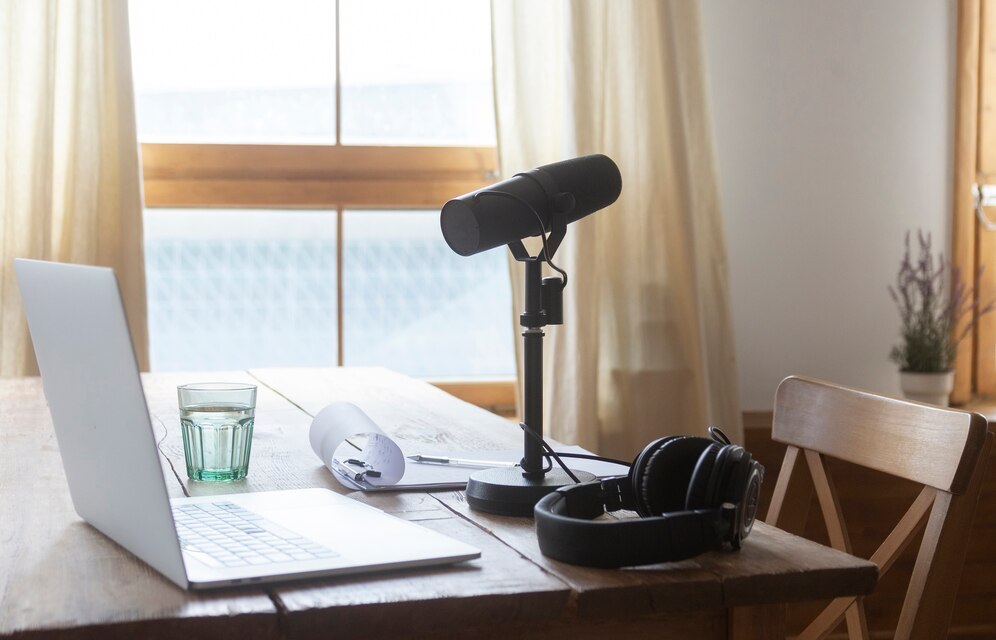Best Laptops and PCs for Voiceover and Audio Editing: The Ultimate Guide

In the world of voiceover work and audio editing, having the right gear can make all the difference between a professional-sounding project and one that sounds amateurish. Whether you’re a seasoned audio engineer or someone just starting to record their first podcast or audiobook, selecting the right laptop or desktop PC is crucial. But with so many options available, how do you know which one will give you the best performance, durability, and value for your money?
This guide is designed to walk you through everything you need to know about the best laptops and PCs for voiceover and audio editing. From powerful processing to stellar audio interfaces, we’ll break down what makes a great machine for this type of work and help you choose the one that fits your needs.
Why Does Your Computer Matter for Audio Work?
Before diving into specific models, it’s essential to understand why your laptop or PC is so crucial for voiceover and audio editing work. Audio files are large, detailed, and resource-heavy. To ensure smooth playback, editing, and processing, your computer must have the processing power, memory, and storage to handle these files with ease.
When you’re recording voiceovers, you need a computer that will offer low-latency performance, meaning there is minimal delay between speaking into your mic and hearing the sound through your headphones. Likewise, while editing, you’ll want a system that can run software like Pro Tools, Adobe Audition, or Audacity without hiccups. These programs require considerable CPU power and RAM to handle real-time editing, multiple audio tracks, and effects.
Key Features to Look For
When choosing the best laptop or desktop for voiceover work and audio editing, there are a few key features that should be top of mind:
- Processor (CPU): The CPU is the heart of your machine. A powerful processor, especially one with multiple cores, will allow your computer to handle complex audio projects. Intel’s i7 and i9 or AMD’s Ryzen 7 and 9 are ideal for audio work.
- RAM (Memory): Audio editing software, especially when dealing with large files and multiple tracks, requires ample RAM. A minimum of 16GB is recommended, but 32GB or more can be beneficial for heavy workloads.
- Storage: Audio files take up a significant amount of space. SSDs (Solid State Drives) offer faster read and write speeds compared to traditional HDDs, making them a must-have for quick access to your files.
- Sound Quality and Audio Interface: While the computer itself is important, don’t forget that the soundcard and audio interface are just as vital. A high-quality external audio interface can make a massive difference in your recordings.
- Display Quality: A high-resolution display with good color accuracy will help you when mixing and mastering audio, where visual precision can sometimes matter.
- Ports: Make sure your machine has enough USB ports for your microphones, interfaces, headphones, and other peripherals. Thunderbolt ports can provide faster data transfer speeds for external drives.
- Battery Life (for laptops): If you plan on recording or editing on the go, long battery life will be a key factor. Aim for at least 8-10 hours, though you’ll often need to plug in for long editing sessions.
Top Laptops for Voiceover and Audio Editing in 2025
1. Apple MacBook Pro 16-inch (M2 Pro or M2 Max)
Apple’s MacBook Pro line has long been favored by creative professionals, and for good reason. The 16-inch MacBook Pro with the M2 Pro or M2 Max chips offers immense processing power, lightning-fast SSD storage, and an incredible Retina display that ensures accurate color representation. This model can effortlessly handle large audio files, numerous tracks, and real-time processing in software like Logic Pro X and Adobe Audition.
- Processor: M2 Pro / M2 Max
- RAM: 16GB – 96GB
- Storage: 512GB – 8TB SSD
- Display: 16.2-inch Liquid Retina XDR display
- Battery Life: Up to 21 hours
The MacBook Pro’s performance is a game-changer for voiceover artists, podcasters, and audio editors alike. Its optimized performance for audio software, excellent mic quality for remote voiceover work, and seamless integration with macOS make it one of the top choices in 2025.
2. Dell XPS 15 (2025 Edition)
Dell’s XPS line has earned a reputation for being a powerful and reliable machine, and the XPS 15 continues that legacy. With its impressive specs, the XPS 15 can easily handle the demands of intensive audio editing while providing excellent display quality and portability.
- Processor: Intel Core i7 or i9 (13th Gen)
- RAM: 16GB – 64GB
- Storage: 512GB – 2TB SSD
- Display: 15.6-inch 4K OLED touchscreen
- Battery Life: Up to 12 hours
The XPS 15 offers excellent audio processing power, a stunning display, and solid build quality. For audio professionals who prefer Windows, this laptop is an ideal choice.
3. Razer Blade 15 (2025)
Though Razer is primarily known for gaming laptops, their Blade 15 is a powerhouse that excels in creative applications like audio editing. This laptop’s fast refresh rate, incredible processing power, and sleek design make it an ideal choice for anyone looking to combine high-performance audio editing with top-tier gaming capabilities.
- Processor: Intel Core i7 or i9 (13th Gen)
- RAM: 16GB – 32GB
- Storage: 512GB – 2TB SSD
- Display: 15.6-inch Full HD or 4K OLED
- Battery Life: Up to 10 hours
The Razer Blade 15 combines the best of both worlds, delivering excellent power for both gaming and professional audio work.
Best Desktop PCs for Voiceover and Audio Editing
1. Apple iMac 24-inch (M1)
If you’re looking for an all-in-one desktop with an aesthetically pleasing design and solid performance, the 24-inch iMac with Apple’s M1 chip is a great option. It boasts excellent processing speed and a stunning 4.5K Retina display that is perfect for high-quality audio work.
- Processor: Apple M1 Chip
- RAM: 8GB – 16GB
- Storage: 256GB – 2TB SSD
- Display: 24-inch 4.5K Retina display
- Battery Life: N/A (desktop)
The iMac’s all-in-one design eliminates the need for additional cables, and its user-friendly macOS interface is a perfect fit for creative professionals. Whether you’re editing voiceovers for an audiobook or producing a podcast, this iMac offers the processing power and clarity you need.
2. Custom-Built PC (Windows)
For those who need a highly customizable machine, a custom-built desktop PC is the way to go. You can choose the exact components that will benefit your audio editing and voiceover needs, such as the latest Intel or AMD processor, high-end SSD storage, and plenty of RAM.
- Processor: Intel Core i9 or AMD Ryzen 9
- RAM: 32GB – 64GB
- Storage: 1TB – 4TB SSD
- Graphics: NVIDIA GeForce RTX or AMD Radeon (for GPU-accelerated audio processing)
- Display: Multiple monitor setup (depending on preferences)
- Battery Life: N/A (desktop)
A custom-built PC gives you flexibility, scalability, and power—perfect for any audio editing workflow.
Comparison Table: Laptops vs. Desktops for Audio Work
| Feature | Apple MacBook Pro 16-inch | Dell XPS 15 | Razer Blade 15 | iMac 24-inch M1 | Custom PC |
|---|---|---|---|---|---|
| Processor | M2 Pro / M2 Max | Intel i7/i9 (13th Gen) | Intel i7/i9 (13th Gen) | Apple M1 | Intel i9 / AMD Ryzen 9 |
| RAM | 16GB – 96GB | 16GB – 64GB | 16GB – 32GB | 8GB – 16GB | 32GB – 64GB |
| Storage | 512GB – 8TB SSD | 512GB – 2TB SSD | 512GB – 2TB SSD | 256GB – 2TB SSD | 1TB – 4TB SSD |
| Display | 16.2-inch Liquid Retina | 15.6-inch 4K OLED | 15.6-inch Full HD/4K | 24-inch 4.5K Retina | Multiple options |
| Battery Life | Up to 21 hours | Up to 12 hours | Up to 10 hours | N/A (desktop) | N/A (desktop) |
| Ideal For | Portability & power | Balance of power & portability | Performance & gaming | All-in-one desktop solution | Customization & power |
| Price Range | High | Mid to High | High | Mid | Customizable |
Frequently Asked Questions (FAQ)
1. What’s the best laptop for voiceover work in 2025?
The best laptop for voiceover work depends on your needs, but for most professionals, the Apple MacBook Pro 16-inch (M2 Pro) is a top choice due to its incredible processing power, amazing screen, and seamless integration with audio software.
2. Do I need a powerful GPU for audio editing?
While a powerful GPU (Graphics Processing Unit) is essential for tasks like video editing and 3D rendering, audio editing typically doesn’t require much GPU power. A solid CPU and plenty of RAM are far more important for audio work.
3. Is a custom-built PC better than a pre-built desktop for audio editing?
A custom-built PC can offer more flexibility and power for audio editing, but it also requires more knowledge and effort. If you’re experienced with building PCs or have specific needs, a custom PC might be ideal. However, a pre-built desktop like the iMac 24-inch (M1) is an excellent choice for a streamlined, all-in-one solution.
Conclusion: Your Next Step in Audio Editing Success
Choosing the right laptop or desktop for voiceover work and audio editing ultimately depends on your workflow, budget, and preferences. Whether you’re leaning toward the sleek power of the MacBook Pro 16-inch, the versatility of the Dell XPS 15, or the customizability of a built-to-order PC, there’s a machine out there to meet your needs.
As technology continues to evolve, there will always be new and improved options, but focusing on processor power, RAM, storage, and the right audio interface will keep you on the cutting edge. Now, armed with this information, you’re ready to make an informed decision about your next audio editing machine.
Happy recording and editing—may your voice sound clearer and your edits smoother than ever!






